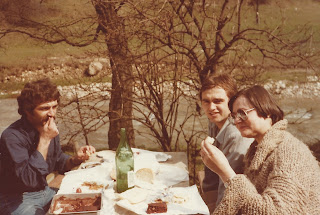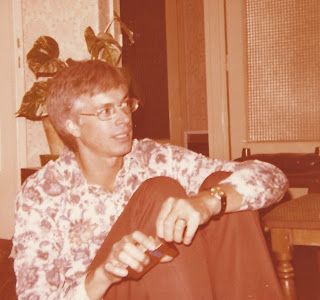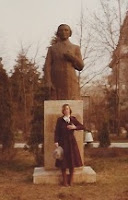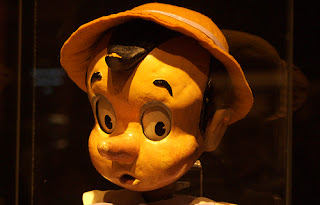 |
| Independence Day image by Watson Media, via Flickr.com |
Canada was the only foreign country I had visited before my move to Iran. My grandfather had emigrated from Minnesota to Canada before Dad was born to homestead. Several of his brothers also emigrated to the area near Medicine Hat, Alberta. Grandpa Wenner returned to Minnesota but his brothers stayed in Canada. Grandpa's parents had also left Minnesota and settled in Montana and five of Grandpa's siblings also moved there. Three of Dad's siblings followed. So when Mom and Dad took us on trips to visit Dad's brothers, sister, aunt, and uncles, we usually took a side trip north, to Canada, to visit relatives there. Those were the days when citizens of Canada and the United States could cross the border without passports. Answering questions about birthplace and citizenship was all that was necessary.
A few years later, still during the time when most Americans and Canadians traveled across the border on showing a driver's license for identification, I saw the differences between the U.S. and Canada up close. One of those Canadian students of my April road trip, John, asked me to marry him, so I had a few opportunities to travel between the U.S. and Canada. I flew to Toronto several times. I drove to Canada with John after we had both attended the wedding of Gayle and Roger in Pennsylvania. And I drove into and out of Canada with John twice. The contrast between the immigration officers representing the U.S. and Canada on those trips was remarkable,
 |
| Canadian flag image by Matzuda, via Flickr.com |
The first time I flew out of Toronto was after John and I had driven from Pennsylvania to Toronto. Toronto was one of the few airports at the time where U.S. Immigration and Customs officials were stationed outside of the U.S. Passengers flying out of Toronto had to clear U.S. Customs and Immigration before even getting onto the plane. I had no problems with Customs, but when I got to the Immigration desk, I was surprised by the agent's questions and attitude. Perhaps what was suspicious was that I was traveling from Canada to the U.S. on a one-way ticket, not a round-trip ticket originating from the U.S. Or perhaps it was that since I had been living and traveling overseas for so many years it was automatic for me to hand over my passport when asked for identification. Most Americans would have handed the agent a driver's license.
After handing my passport to the agent, he asked me where I was born, where I lived, how I had gotten into Canada, and maybe a few other questions. Then he asked me to recite the Pledge of Allegiance. Now I had no objections to reciting it then, and I have none now, but it had been many years since I had recited those words, and I don't think I had ever had to say them alone. In the past, I had had at least a classroom full of other students around me as I spoke those words.
So I started. "I pledge allegiance to the flag of the United States of America. Is that enough?" I asked.
"No," he replied.
"I can't remember how the next line goes," I said.
He said, "And to the Republic..." and he paused, looking at me with expectation in his eyes.
"...for which it stands, one nation under God, indivisible, with liberty and justice for all."
He stamped my boarding pass, handed it and my passport back to me, and motioned for me to continue. No "Welcome to America." Just a head gesture to indicate I should move on.
The next time I went to Canada, I flew in, but John and I drove out. When we reached the border this time, one of the questions asked was where we were born. For me, that was not so troublesome. "Fargo, ND," I replied. But for John, it was complicated. "Yugoslavia," he said. The agent then asked us to pull John's car over to a covered area to one side of the border inspection station. Once there, other agents asked us to get out of the car and give them our identification. I hadn't learned my lesson yet, so again I handed the agent my passport.
This passport was a normal tourist passport with 24 pages in it, but all 24 pages had been filled with entry, exit, and residence permits for my two years in Iran, my year in Romania, and all my travels in between. As a result, I had had to have extension pages added. These pages were folded into the passport like an accordion. When the last extension page was tugged on, the full set of 24 extension pages pulled out, like a trick done by a sleight-of-hand card dealer. Once the agent did that, he walked away from me and to a desk, picked up the phone receiver and started dialing.
At that point, other agents had removed everything from the trunk of John's car and were about to begin removing the side panel of the passenger door. I walked to the desk where the agent with my passport was sitting and explained to him that I had so many stamps in my passport because I was a teacher of English as a Second Language and that I had just returned from Romania where I taught on a Fulbright fellowship at one of the Universities. I also explained that John and I had met there while he had been a graduate student of ethnomusicology in Romania.
I will never know if he had already gotten information from whoever was at the end of the phone or if my explanation was somehow so overwhelmingly helpful that he was convinced John and I were not illegal immigrants, drug smugglers, Serbian terrorists, or simple identity thieves. But he did hang up as I finished my explanation, and he shouted over at the guy with the tools ready to take John's car apart that he could stop now. The agents put our bags back into the car and let us drive away.
Again, I don't think there was any "Welcome home."
So to all my Canadian friends, Happy Canada Day. Your country always made me feel welcome. I hope mine has done the same for you.






























